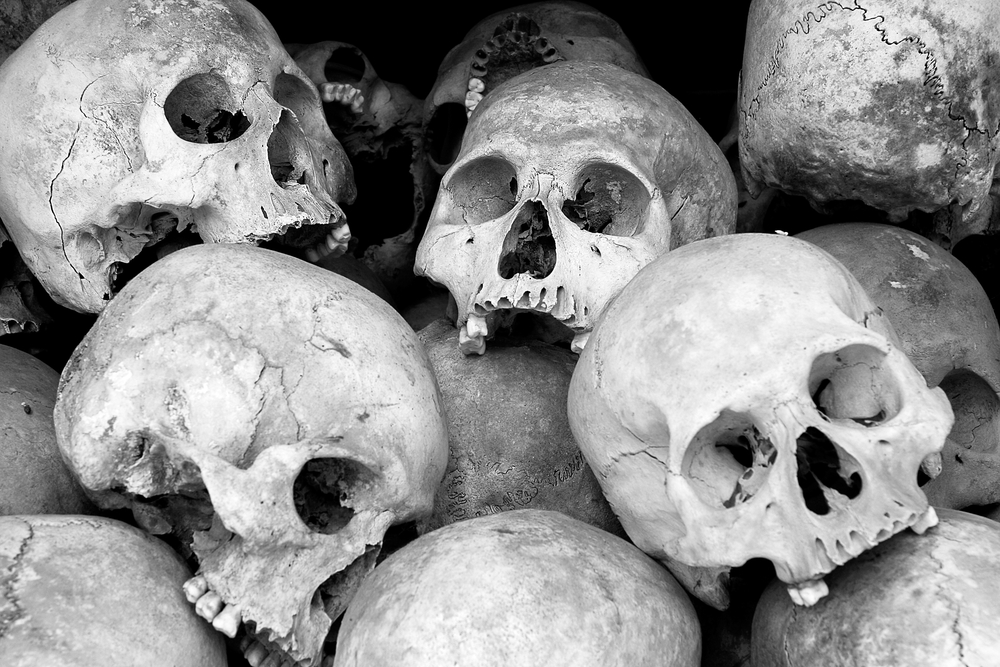When We Call Genocidaires “Monsters”

Netflix’s The Devil Next Door, a docuseries about an elderly man in Ohio accused of being Nazi death camp guard, received critical acclaim. While the topic may be interesting, the title is noteworthy. It is not uncommon for different media to refer to genocidaires (a term usually used to describe perpetrators of the Rwandan genocide) as monsters or devils. Books, such as “Hitler’s Monsters” and “The Devil Came on Horseback” (about the genocide in Darfur), tabloid journalism, and periodicals utilize similar language.
Such language seems innocuous, even appropriate given the gravity of the perpetrators’ sin. After all, it would appear only monsters and devils would be capable of committing such a monstrous and hellish crime. Amidst the complexity of studying genocide, the one incontrovertible assertion is that genocidaires are indeed monsters and devils. Or is it?
Despite the labels’ ubiquity in popular culture and common parlance, there are a few reasons to believe that society should refrain from using such characterizations. Aside from the risk of dabbling in the same dehumanizing language used by the genocidaires themselves, such characterizations obscure one’s ability to understand how genocides unfold and serve to perpetuate a mythology of evil. Referring the agents as something other than human also removes their culpability, distancing human society from the inhuman perpetrators.
It is a weak and potentially regressive starting point for analyzing the causes of genocide. Are the genocidaires born monsters? Or do they become monsters? How can we spot the monsters before they commit genocide? How do we stop them? How do we hold them accountable to human standards of justice and morality?
Perhaps the greatest obfuscation of these labels is that it makes the crime of crimes appear extremely unlikely, requiring the intervention of the Devil incarnate into Earth’s affairs. But in fact, it requires the participation of everyday human beings to plan and carry out a policy of genocide. They are civilians. They are neighbors. They are friends. They are relatives. While the act itself is the embodiment of horror, its organization and execution is disturbingly unexceptional.
The origin of this notion that only a supernatural, inhuman force of villainy could cause such heinous acts may be found in the horror stories of centuries past. John Douglas, a former FBI agent who spent his career studying the psychology of serial killers, claims novelists and storytellers created fictitious monsters to explain seemingly inexplicable murders and massacres. But we have the tools now to better explain past heinous acts in the pursuit of preventing future ones from occurring.
In their book, Architects of Annihilation: Auschwitz and the Logic of Destruction, Goetz Aly and Susanne Heim examine the role of German scientists and scholars in the Holocaust. These intellectuals posited deportation, ghettoization, displacement, sterilization, and mass murder as a solution to German’s population “problem”. As Goetz and Heim conclude, “To a very large extent the policy of annihilation was the product of a rational argument taken to a mercilessly logical conclusion.”
The two writers make another noteworthy observation: These intellectuals, who served as advisers to the civilian administrations and the SS, “did not match the stereotype of the zealous, narrow-minded Nazi ideologue, and who argued their case objectively and dispassionately.” In other words, they saw their advocacy for genocide as merely fulfilling their professional duty to advise the government, even though their scientific recommendations were glaringly absent of any consideration of the value of human life.
Rationalist accounts of genocide, such as Architects of Annihilation, focus on genocidal planning and cost-benefit analysis. Analyzing genocide as the logical end of a rational argument demystifies the crime and demonstrates that genocide is not a far-fetched phenomenon conjured by evil but rather policy option, requiring the participation of seemingly ordinary individuals to organize and execute. While rationalist accounts explain the logic of genocide, they fail to account for the ideological, racist, and irrational forces that seek to justify genocidal policy.
Structuralist accounts, on the other hand, seek to understand the macro-level features of society that permitted the genocide to occur. Ian Kershaw writes that a structuralist explanation of the Holocaust focuses the “ad-hoc responses of a splintered and disorderly government” which “produced an inevitable spiral of radicalization.” Zygmunt Berman made the highly influential assertion that modernity was a necessary condition for the Jews to be annihilated in systematic fashion. While this approach does not blame existing bureaucratic or larger societal forces for genocide, it does acknowledge the role these institutions and systems played in facilitating these acts and how their power was harnessed. Other accounts focus on the intent of the genocidaires, the purported causal linkage of colonialism and war, or the role of inflamed ethnic or cultural animosities.
But notice, among the variety of serious explanatory tools, none seek to ascribe a monstrous or satanic nature to the human perpetrators, partly because it fails to explain why or how genocide occurs. Of course, labeling genocidaires as “monsters” and “devils” does not prevent one from understanding the crime, but the labeling is conceptually inconsistent with any accurate explanation and also unintentionally denies the perpetrators’ human moral responsibility. It discounts the very real possibility of this very human phenomenon.
As Hanna Arendt noted, this evil is banal. The devil next door is no devil at all. He is a human. And that might be even more frightening than the monsters our horror novels depict.




